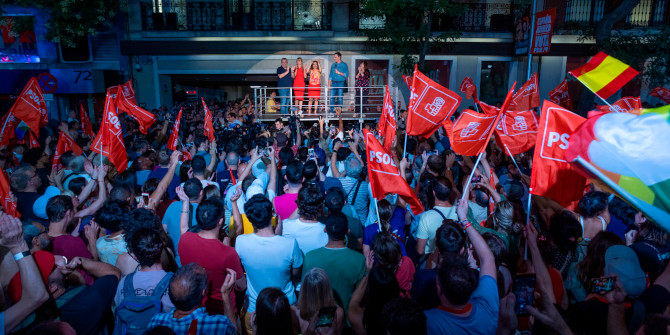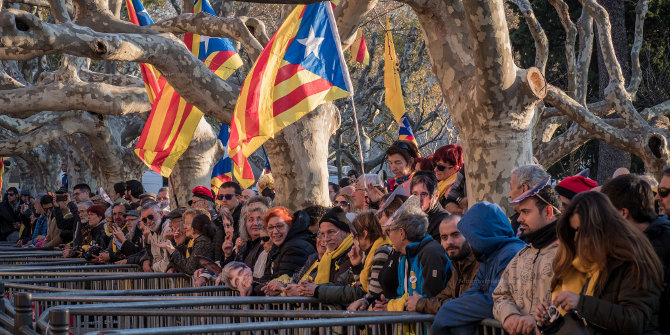 How has the Ukraine conflict affected relations between Russia and Central and Eastern European EU member states? Cristian Nitoiu writes that while the response to the crisis has been heavily dependent on the domestic political circumstances within individual countries, there has been a clear revival of nationalist and anti-Russian sentiments which politicians have sought to use to their advantage.
How has the Ukraine conflict affected relations between Russia and Central and Eastern European EU member states? Cristian Nitoiu writes that while the response to the crisis has been heavily dependent on the domestic political circumstances within individual countries, there has been a clear revival of nationalist and anti-Russian sentiments which politicians have sought to use to their advantage.
The current conflict in Ukraine is increasingly making politicians revert to nationalism and history in order to justify their actions. They interpret history in various ways which sometimes conflict with each other. For example, on the one hand, Russia put on a huge military display on the 70th anniversary of the victory in the ‘Great Patriotic War’ back in May. This enticed the already searing nationalism present in Russian society. On the other hand, June marked 75 years since the Baltic countries and Romania received ultimatums from the Soviet Union to hand over territories. Similarly to the Kremlin, leaders from these countries used the occasion to highlight the ‘Russian threat’ and stir up nationalist feelings.

The use of nationalist ideas and history by leaders in the new Central and Eastern European EU member states is not new. However, the Ukraine crisis has opened the floodgates for nationalist rhetoric in these countries. This is not surprising as Russia’s actions in eastern Ukraine have emphasised that the region is not as safe and conflict-free as many countries in the region thought it was.
Moscow has employed a wide range of tools in order to legitimise in front of its own public the ‘hybrid war’ waged in eastern Ukraine. The Kremlin has appealed to the nationalist and patriotic sentiments deeply ingrained in Russian society through large scale propaganda. This is a strategy intended to frame the conflict in Ukraine as a ‘sacred war’ against fascism. Moreover, the West is presented as a promoter of fascism that wishes to undermine the historical legacy of the Soviet Union and the Russian way of being.
In turn, Russia’s actions and rhetoric have made people and leaders in the new Central and Eastern European EU member states rediscover and develop similar nationalist feelings. These countries increasingly tend to look back in history and build narratives that put the blame on Russia and to a lesser extent the West (for not coming to their aid in the face of the ‘Russian threat’). Public discourse in these states is becoming militaristic, as they opt for conscription, push for the idea of arming Ukraine or host on a semi-permanent basis US and NATO forces.
Poland
The surprise win in the recent presidential election in Poland by the candidate of the conservative party Law and Justice symbolises the shift towards nationalism and anti-Russian feelings in Polish society. The country is split, with the eastern half deeply worried by Russia’s actions in Ukraine or Moscow’s potential aggression in the Baltic countries. Polish politicians have a long tradition of using the ‘Russian threat’ in order to score electoral points and strengthen their position. However, the Ukraine crisis has ramped up the instrumental use of the threat posed by Russia and has brought back memories from the Second World War and the Communist period.
On the bright side, the crisis has also led to reconciliation between Poland and Ukraine, as nationalist grievances and tensions between the two countries have dwindled. In defending the country from the ‘Russian threat’ Polish politicians look towards the US and NATO. Nevertheless, Polish society is starting to realise that a militaristic attitude might not be the best answer to the ‘Russian threat’ as public support for military aid to Ukraine and integration in NATO has decreased during the past year, even though it remains at a high level.
The Baltic countries
In Lithuania nationalist rhetoric is not as ubiquitous as in Poland. Nonetheless, the 75th anniversary of the Soviet ultimatum was framed by president Grybauskaitė as a day that left deep scars on the Lithuanian people. Moreover, a series of seemingly nationalist policies have been adopted recently. Most prominently Lithuania reintroduced mandatory conscription and was the first NATO country to pledge lethal military aid for Ukraine. In May it staged a series of military exercises against a potential hybrid war on its territory initiated by Russia. There have also been proposals to limit/reduce Russian language content in the media by 90 per cent together with increased fines for media institutions which spread Russian war propaganda. Combating the ‘Russian threat’ is also the rationale for a proposal to establish mandatory school courses on the history of the Lithuanian fight for freedom.
Latvia and Estonia differ from Lithuania as they have a much larger Russian minority and direct borders with Russia. The status of the Russian language and of the Russian minority has long been an issue of contention in these countries’ relations with Moscow. To that extent the ‘Russian threat’ and nationalist ideas have been much more present in the last 20 years in these two countries than in Lithuania. Hence, the rise in nationalism during the Ukraine crisis has not been as impressive as in Lithuania. Both Estonia and Latvia have also welcomed NATO and US forces, but have had a cautious attitude towards the large Russian minority on their territory.
Romania
Out all the new member states Romanian public opinion has the lowest approval rate for Putin’s regime and Russia’s actions in Ukraine. This attitude is to a large extent motivated by the memory of the annexation of Moldova in 1940 and the threat that the hybrid war might spread to Transnistria. Romanian leaders have used the ‘Russian threat’ in order to foster their role as protectors of the nation. They have consistently supported the unification movement with Moldova while promoting the slogan ‘Moldova Romanian land’.
The Ukraine crisis has also been used by politicians to shift the focus from cases of high-level corruption to the threat that Russia poses to the statehood of small states. The ‘Russian threat’ has also led to a recent increase in US and NATO forces in Romania, whose main aim is to safeguard the ‘nation’ from a potential Russian attack. However, the true rationale behind this rhetoric is questionable. Prime Minister Ponta, who is known for his authoritarian tendencies, was one of the few EU leaders to attend the Sochi Olympic Games and the recent European Games in Baku.
Hungary
Hungary is a special case as the rise of nationalism is related only marginally to the Ukraine crisis. Prime Minster Orban banked on nationalism and the issue of Hungarians living abroad in order to strengthen his rule and undermine democratic processes and institutions. The annexation of Crimea gave Orban the opportunity to suggest a similar outcome for the Transcarpathia region of Ukraine which is mostly inhabited by ethnic Hungarians.
The revival of genuine anti-Russian feelings?
Nationalist and anti-Russian feelings have always been present in varying degrees in the post-Communist/Soviet EU member states. They have now become radicalised. This behaviour is not surprising as when faced with sudden changes and the onset of uncertain times people generally tend to reject change and revert to comfortable well known ideas (in this case nationalism).
Politicians in the new member states are increasingly using nationalist and anti-Russian rhetoric to their own advantage. However, history and nationalism are among the most dangerous and unpredictable tools that politicians have at their disposal. The revival of nationalism in the ‘new’ Europe could lead to a complete loss of trust in Russia, further escalation of the conflict in eastern Ukraine, and ultimately a deep security dilemma.
Nevertheless, anti-Russian attitudes should not be understood as being directed against the Russian people. Anti-Russian views reflect disapproval with the external expansion of the system of governance promoted by the current government in Russia and with the way it treats its neighbours. This is an outright rejection of the Soviet way of doing politics and business which the Kremlin is currently perceived to be aspiring to.
Please read our comments policy before commenting.
Note: This article gives the views of the author, and not the position of EUROPP – European Politics and Policy, nor of the London School of Economics.
Shortened URL for this post: http://bit.ly/1LTxGYG
_________________________________
 Cristian Nitoiu – LSE IDEAS
Cristian Nitoiu – LSE IDEAS
Cristian Nitoiu is a Dahrendorf Postdoctoral Fellow in EU-Russia relations and Ukraine at LSE IDEAS. Before this he held research positions at Trinity College Dublin and the College of Europe (Natolin campus, ENP Chair). The research for this article was supported by the Dahrendorf Forum, a joint initiative by the Hertie School of Governance, LSE and Stiftung Mercator.





Beware the leader who bangs the drum of war in order to whip the citizenry into a patriotic fervor. For patriotism is indeed a double-edged sword. It both emboldens the blood, just as it narrows the mind.
-Gaius Julius Caesar
And this quote will do nicely here too:
”Patriotism is proud of a country’s virtues and eager to correct its deficiencies; it also acknowledges the legitimate patriotism of other countries, with their own specific virtues. The pride of nationalism, however, trumpets its country’s virtues and denies its deficiencies, while it is contemptuous toward the virtues of other countries. It wants to be, and proclaims itself to be, “the greatest”, but greatness is not required of a country; only goodness is.” -Sydney J. Harris, American journalist and author (1917-1986
Indeed, eastern-European politicians have a long tradition of using the ‘Russian threat’. Except not to score electoral points, but to suck up to the US state department. Just ask Radek Sikorski, Polish minister of foreign affairs, whose taped statements were recently published.
The public is not especially russophobic; most people are not idiots or bigots.
The emergence of powerful nationalist movements follows naturally from the loss of sovereignty, subservience to the EU, IMF, from migration of the most productive young people to the west, and so on.